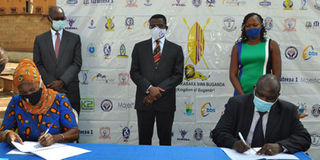Prime
Katikkiro Mayiga calls for collective efforts as Buganda Kingdom signs pact with conservationists

Buganda Minister of Lands, Environment and Bulungi Bwansi, Hon Mariam Mayanja Nkalubo (l) and WWF Acting Country Director, Simon Peter Weredwong (R) singing the MOU (PHOTO/Courtesy)
What you need to know:
Recently, the Government launched a programme aimed at restoring at least 16% of the forest cover that has been lost within the last two decades
KAMPALA — Buganda Kingdom Prime Minister Owek. Charles Peter Mayiga has called for joint efforts in environmental protection to ensure sustainable development countrywide and pledged Buganda would continue to make its contribution.
Katikkiro Mayiga was on Thursday 7 January 2021 speaking at Kingdom headquarters in Mengo, Kampala where the Kingdom entered into a working partnership with the World Wide Fund for Nature and a network of non-governmental conservationists to promote environmental conservation.
The Katikkiro said the Buganda Kingdom has over the years been beautiful with waters, forests, and wild animals as he went on to unveil the Buganda Kingdom Board for Environment Conservation and said Buganda attaches great importance to environmental protection and firmly committed itself to conserve it.
Uganda’s natural environment has been deteriorating over the years but Katikkiro attributed the issue to increased human encroachment on illegal issuance of land titles in forests, charcoal burning, and large-scale conversion of natural forest land to agriculture.
For instance, the forest cover in the country has reduced to about 8% from over 24% in the 1990s.
Recently, the Government launched a programme aimed at restoring at least 16% of the forest cover that has been lost within the last two decades.
“We need a collective response to end this crisis. The Kingdom of Buganda together with the World Wide Fund for Nature are launching a partnership to work towards nature recovery not just in the Kingdom but Uganda at large,” he said.
“We are calling upon everyone to reduce plastic pollution by stopping the use of single-use plastics and Kaveera. Acquire a water bottle and learn the behavior of refilling as opposed to using and dumping”. He said
He revealed that the Buganda Kingdom will ensure that all schools will have to institute a Kaveera checkpoint to ensure Kaveera is prohibited on school premises.
This, he explained, the campaign will help the young people understand the danger of plastics on the environment and innovate ideas on how to deal with it.
He asked all households in Buganda to plant a lemon or citrus tree, saying that the arrangement will be a source of income and but also contribute to the recovery of a green Buganda.
Mr. Simon Peter Weredwong, the WWF Uganda Country Director said the continued loss of Uganda’s biodiversity presents a serious challenge to the country’s growing population.
He lauded Ugandan authorities for spearheading the process of formulating policies and legal regimes that are steadily repositioning biodiversity in Uganda. “The efforts to put in place the National Biodiversity Strategy and Action Plans (NBSAPs) has been a commendable tool too, he said.
Mr. Weredwong said WWF Uganda working with its partners has supported government efforts to ensure the inputs into policy reviews and legislations.
Key among other examples, he said cited the Forestry policy, the National Environment Action Plan, the Wildlife Act, and the National Oil and Gas policy among others.
“Our work has also continued to be observed in restoring the integrity of protected areas by building the capacity of UWA staff and district local governments within the Albertine Graben”.
He said WWF has also worked with NFA to restore over 700 Hectares of degraded forests in the last three years.
He said the working partnership with the Buganda Kingdom is timely as it will facilitate ecosystem restoration in Uganda.
“In line with this, we join the Buganda Kingdom to rally Ugandans to say No to plastic and Kaveera pollution”.
He revealed that WWF chose the Buganda Kingdom because it provides a platform to reach not only a big number of people but also national coverage. “The Kingdom also runs several schools, health institutions, and businesses who would benefit most from strategies being promoted through this partnership”.




